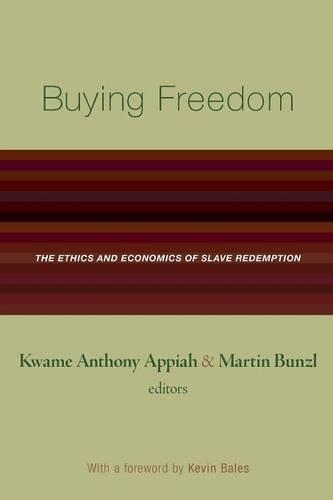
Buying Freedom: The Ethics and Economics of Slave Redemption
(Paperback)
Publishing Details
Buying Freedom: The Ethics and Economics of Slave Redemption
By (Author) Kwame Anthony Appiah
Edited by Martin Bunzl
Foreword by Kevin Bales
Princeton University Press
Princeton University Press
2nd October 2007
United States
Classifications
Professional and Scholarly
Non Fiction
Human rights, civil rights
Ethical issues, topics and debates
306.362
Physical Properties
Paperback
280
Width 152mm, Height 235mm
397g
Description
If "slavery" is defined broadly to include bonded child labor and forced prostitution, there are upward of 25 million slaves in the world today. Individuals and groups are freeing some slaves by buying them from their enslavers. But slave redemption is as controversial today as it was in pre-Civil War America. In Buying Freedom, Kwame Anthony Appiah and Martin Bunzl bring together economists, anthropologists, historians, and philosophers for the first comprehensive examination of the practical and ethical implications of slave redemption. While recognizing the obvious virtue of the desire to buy the freedom of slaves, the contributors ask difficult and troubling questions: Does redeeming slaves actually increase the demand for--and so the number of--slaves And what about cases where it is far from clear that redemption will improve the material condition, or increase the real freedom, of a slaveBuying Freedom includes essays by the editors and by Dean Karlan and Alan Krueger, Carol Ann Rogers and Kenneth Swinnerton, Arnab Basu and Nancy Chau, Stanley Engerman, Jonathan Conning and Michael Kevane, Jok Madut Jok, Ann McDougall, Lisa Cook, Margaret Kellow, John Stauffer, and Howard McGary.
Reviews
"Slavery In the modern world Many readers will be shocked to read that human beings are still owned, bought, and sold. Editors Appiah and Bunzl present a series of essays documenting current slavery issues in a broad context as well as providing a historic context, analyzing some changes that have occurred in slave-based industries from the late 1700s to the present."--D. E. Mattson, Choice "Buying Freedom is an instructive volume on the question whether slave redemption makes sense or not. The contributions cover the most varied methodological approaches, which is certainly an asset of the book."--Paul Ramskogler, Journal of Economic Issues
Author Bio
Kwame Anthony Appiah is the Laurance S. Rockefeller University Professor of Philosophy at Princeton University. His books include "Cosmopolitanism" (Norton). Martin Bunzl is professor of philosophy at Rutgers University and the author of "Real History: Reflections on Historical Practice".
